This Blu-ray from Severin Films is currently available for purchase.
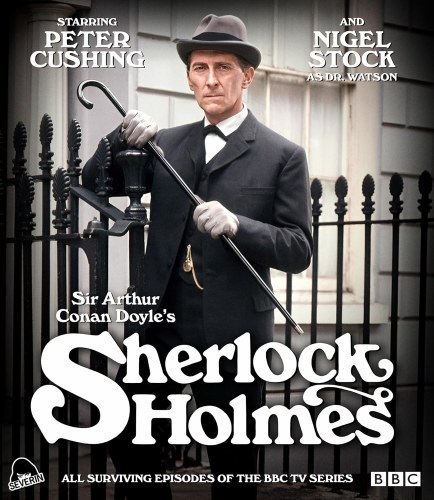
Many horror fans know actor Peter Cushing as the star of numerous Hammer and Amicus horror pictures like The Curse of Frankenstein and Horror of Dracula. But according to an archival interview with the actor featured on this release, British audiences primarily recognized him for his part as Sir Arthur Conan Doyle’s famous detective, Sherlock Holmes. He memorably played the character in Hammer Films’ The Hound of the Baskervilles (1959), which is considered one of the best adaptations of its era. Less than a decade later, he returned to the role in a 16-episode BBC television series.
This show, known as Sherlock Holmes, or Sir Arthur Conan Doyle’s Sherlock Holmes was reasonably successful and delivered fairly faithful retellings of its source material. Unfortunately, because TV productions at the time weren’t held in as high regard as films and the producers had licensed the stories for a production with only a couple of airings (this is long before the days of home video), many of the episodes are completely lost. In fact, since they couldn’t be shown again, the BBC reused the master tapes and recorded new programming over them.
Well, that is, for all but six episodes (with one being a two-parter of The Hound of the Baskervilles). They have been saved and are now available on a 2-Blu-ray set from Severin Films.
This is, apparently, the first BBC show to be shot in color. Admittedly, since it was captured on video technology that is now long out of date, the picture looks quite crude and soft (mixed with exteriors shot on film that are slightly sharper). Dark interiors are particularly rough, so the disc doesn’t deliver reference-quality material for anyone’s home video system. There are several onscreen blips that feel reminiscent of watching a VHS tape.
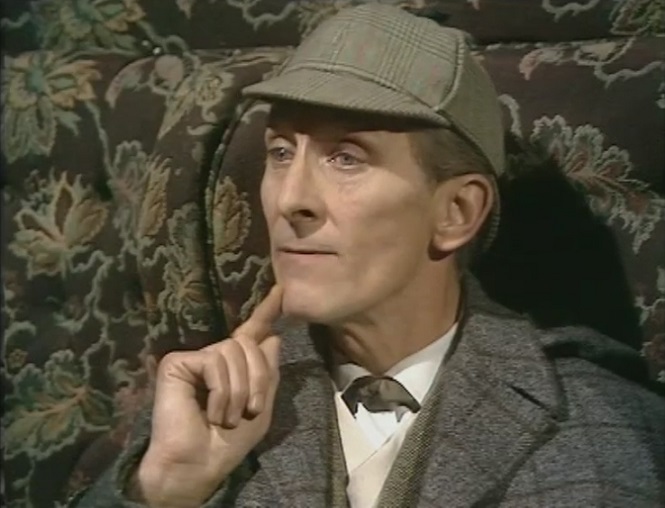
Still, Holmes enthusiasts will be happy to learn that this was a good show and a few of these episodes are very entertaining. A Study in Scarlet, The Hound of the Baskervilles, The Boscombe Valley Mystery, The Sign of Four and The Blue Carbuncle are the surviving tales featured on the disc. There are several things about them that will strike any first-time viewer. One is that the murders themselves, beginning with A Study in Scarlet, are quite graphic. There are stabbings, as well as (in a later episode) a character having their skull smashed in with a large rock. Even the demise of a villainous figure drowning in a muddy marsh makes an impression. The slayings, as shown, are distinctive and disturbing for the era.
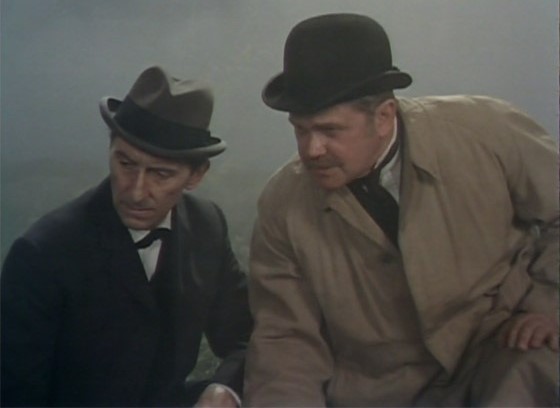
In the roles of Sherlock Holmes (Peter Cushing) and Dr. Watson (Nigel Stock) the two leads are effective. Cushing is stern but relatable and slightly different from his character in the earlier adaptation of the Baskervilles story. Like all other portrayals of the character, he’s fascinated and determined to solve the cases he accepts, but isn’t so obsessed that he doesn’t show any human qualities. It may be an old-fashioned approach to the character, but one that actually feels fresh in comparison to modern adaptations.
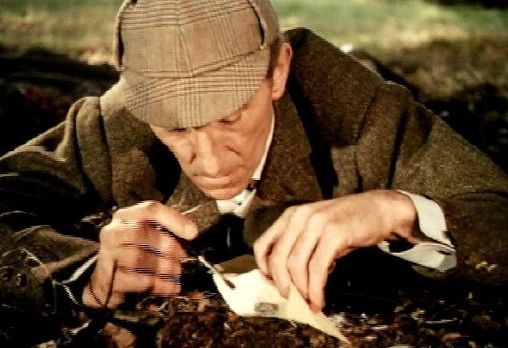
While some of the plot events have been moved around resulting in a few storytelling issues (like in the original book, Holmes and Watson are still absent from a large part of the Baskervilles story), much of the dialogue in the episodes is right out of the source material, giving conversations a nice, authentic feel.
And the final episode, The Blue Carbuncle, is really unique in that it deals with a stolen jewel and (believe it or not) a goose theft rather than a murder. It’s also a Christmas episode (some experts believe it may be the first example in this now-common tradition for British TV-series). The tone is slightly lighter, but does contain a distinct message suggesting author Doyle may have inserted some social themes into his written work. This is an interesting, almost heartwarming episode that shows a unique side of the character.
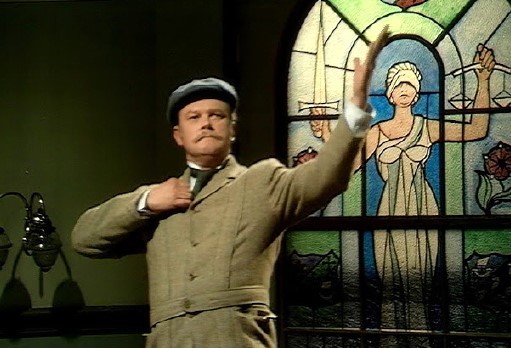
I was pleased to see this show and can understand why many Brits who grew up with it would remember it fondly. It doesn’t exactly wow viewers, but presents solid adaptations of the source material with crime sequences that are appropriately jarring. As mentioned, it’s unfortunate that the video quality isn’t ideal, but given the source material, this is as good as it will ever look.
The Blu-rays come with enjoyable bonus material. There is a commentary track on each episode, featuring various pairings of Kim Newman (Holmes enthusiast and author of Anno Dracula), Barry Forshaw (author of Brit Noir) and David Stuart Davies (author of Starring Sherlock Holmes: A Century of the Master Detective Onscreen). They give valuable background information and insight into the episodes.
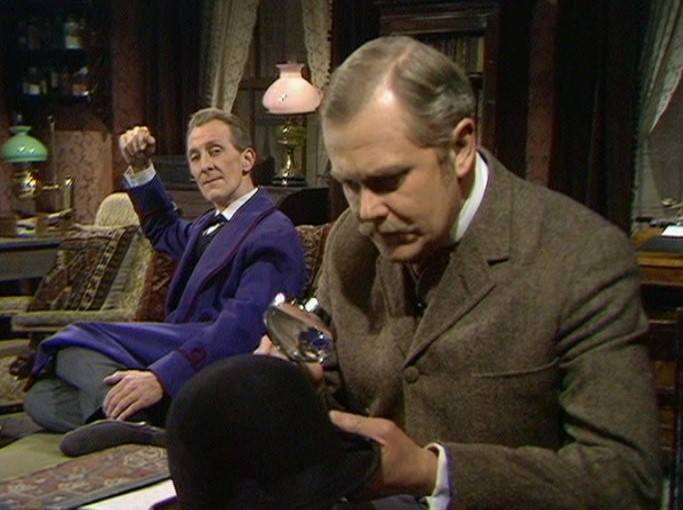
There are some notable observations about this and many other Sherlock Holmes movies and series. Newman notes that modern interpretations of the character have really changed, presenting the detective as unstable and almost sociopathic. In this more faithful version, the lead is stuffy, but still human and relatable. Some episodes (like the final one) really focus on his quite-normal-for-the-era hobbies. He may be focused on his workload and perfecting the use of his mind as a tool to solve crimes, but he does have some sense of morality (he even goes off on one individual for nearly causing the execution of a man in order to protect his social status). The crimes depicted are familiar, but those who look beyond the surface will find subtle criticism of Victorian values.
This also leads to a fun discussion about enthusiasts who perhaps look too deeply into the minutia in Doyle’s original stories. It seems that the author was constantly trying to meet public demand for new material and so details about Holmes and Watson change. Some have taken issue with it, but the experts are fairly certain that Doyle wasn’t above altering details about the protagonist’s past if it served the current story. The pair also note some criticisms of things like Holmes’s fencing skills seen in the Robert Downey Jr. Sherlock movie series, saying that ability actually is from one of the original stories. They summarize that Doyle wanted to create entertaining books and likely didn’t think that people would be studying and critiquing every plot detail and character trait in his stories more than a century later.
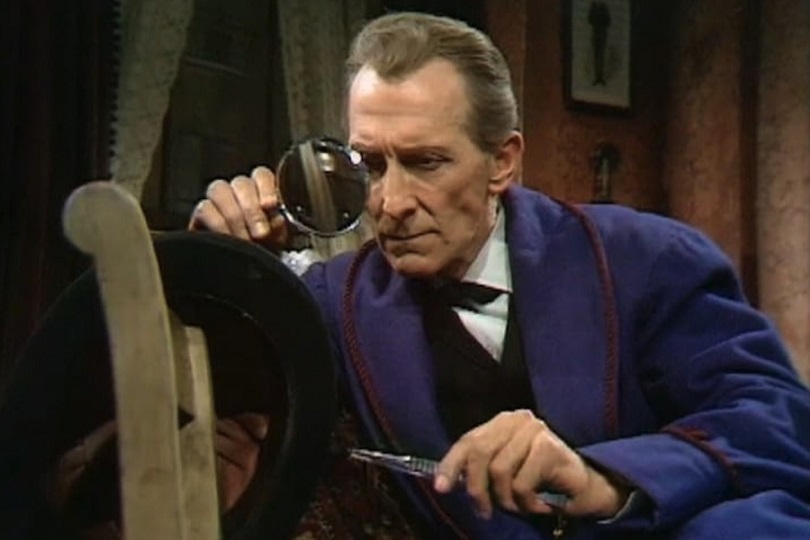
The tracks are all fascinating, and there are a couple of other bonuses. One is an archived audio interview with Peter Cushing on his experiences playing Sherlock Holmes. This is where he states that it is the role he is most famous for in his home country (he even played Holmes again in a 1984 British TV-movie). When he is asked why his take on Holmes in the TV show is softer than in the 1959 Baskervilles film, the actor gives a convincing answer. He suggests that since Holmes isn’t in the 1959 movie a lot, he isn’t as developed as in the show and comes across as curt since his role in the story is one of more action than chatting.
Additionally, there is a nifty series of clips from lost episodes. It’s only four or five scenes (from international sources, perhaps used as promo material for the show) with each lasting a couple of minutes, but it does make one wish that these programs hadn’t been erased from existence.
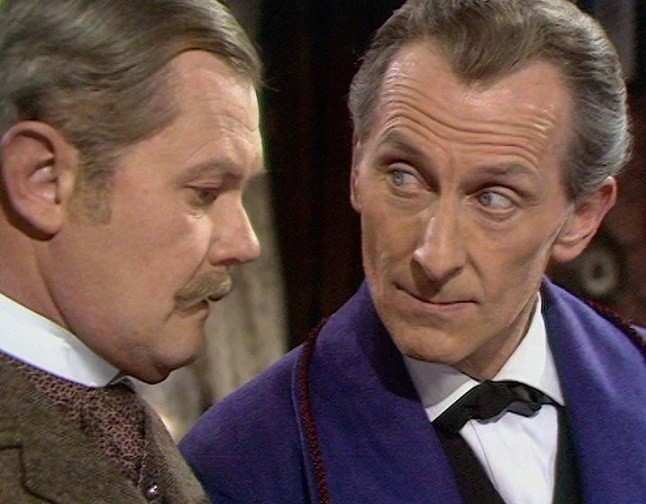
It’s fascinating to see the BBC’s television adaptation of Sherlock Holmes. It shows off a different side of Peter Cushing and, in some respects, gives viewers an idea and a feel for the Doyle books and the dialogue contained within. If you enjoy the famous fictional character and aren’t expecting stellar image quality, the release is worth picking up.


